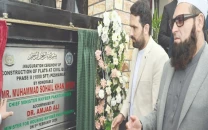NMDs want promotion of girls education
Residents demand action against absent teachers

The residents of the newly merged districts (NMDs) of Khyber-Pakhtunkhwa (K-P) have demanded promotion of girls’ education, a clear policy on border trade and recruitment of local female schoolteachers in their areas during consultative sessions with officials of the provincial government.
They also pointed out that teachers remained absent from duty in girls’ schools.
Some of them suggested that government should relax the recruitment criterion to overcome the shortage of female teachers. K-P government has organized consultative sessions with local residents in 25 subdivisions (seven districts and six former Frontier Regions) of NMDs to solicit their feedback on the ongoing development work.
The exercise was carried out with technical assistance from the Merged Areas Governance Project (MAGP) of United Nations Development Programme (UNDP) and supported by United States Agency for International Aid (USAID).
This was not the first time such a consultation was held in the region. After the merger of erstwhile Federally Administered Tribal Areas (FATA) in 2018, the K-P government held a similar consultative drive in March 2019 in an effort to fulfil its pledge to the people of NMDs under the first phase of Accelerated Implementation Programme (AIP).
Based on locals’ feedback in the first consultation session, Rs108 billion has been spent so far on development schemes under AIP-I (2019 – 2022).
“With our partner MAGP, these consultations on subdivision level have helped us bring people’s voices to the highest tiers of policymakers to create context-specific solutions,” said K-P Additional Chief Secretary Shahab Ali Shah. One of the most common demands residents put forth during these sessions was education for girls.
“In almost every subdivision, people emphasized on the need for education for girls, a welcome shift in the mindset,” said MAGP Sector Specialist on Infrastructure Tahir Azeem, who facilitated the consultative sessions in Bajaur, Khyber and Mohmand districts. “People’s main concern was high absenteeism among teachers in girls’ primary schools,” he explained.
Literacy rate in the tribal region is extremely low, especially for women. As per the AIP baseline survey conducted by the provincial government and MAGP, only 22 per cent of females were educated up to secondary level whereas the rest have not received any education at all in NMDs.
“Due to lack of education schoolteachers’ positions are filled by women from settled districts. However, because of the long and tiresome commute, many teachers don’t come to schools. They also fear for their safety,” Azeem maintained.
Sharing people’s demands, he said the residents suggest the government relax the eligibility criteria and recruit more women from the local community to teach primary classes. “These women may not be as highly qualified but they can at least teach girls in primary schools,” Azeem said, adding that residents demanded hostels or cluster accommodations for teachers, especially subject specialists the government is hiring for secondary schools.
They also demanded transportation for female teachers. Furthermore, people have demanded that the K-P government extend the Independent Monitoring Unit (IMU) of the provincial education department to the NMDs and keep a check on the quality of education.
Published in The Express Tribune, April 18th, 2022.



















COMMENTS
Comments are moderated and generally will be posted if they are on-topic and not abusive.
For more information, please see our Comments FAQ